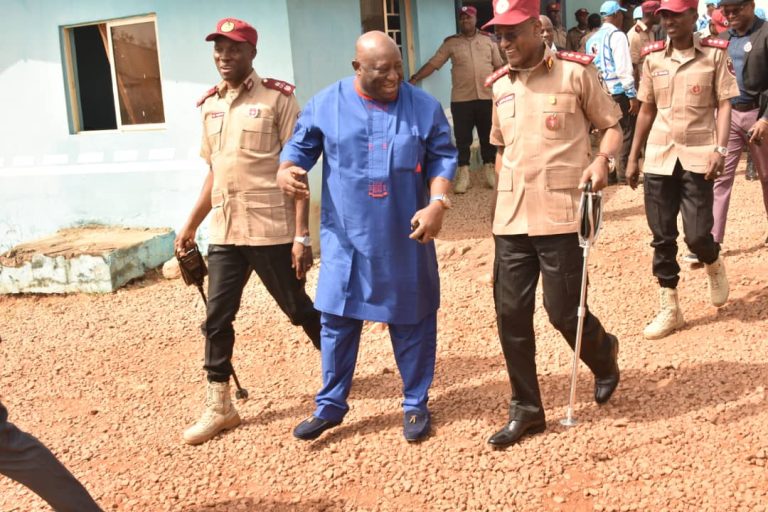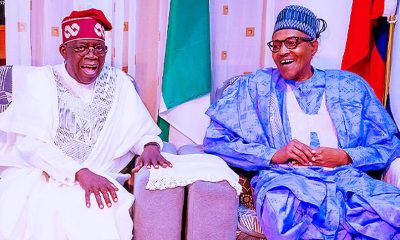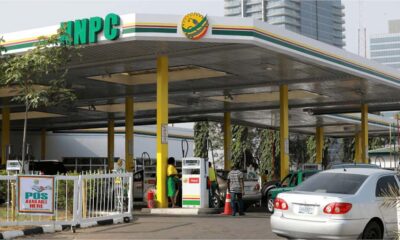Business
Fuel queues persist in Lagos, others despite NNPC assurances

Fuel queues persist in Lagos, others despite NNPC assurances
Emmanuel Addeh in Abuja, Peter Uzoho in Lagos, Adibe Emenyonu in Benin City, John Shiklam in Kaduna, Ahmad Sorondinki in Kano and Blessing Ibunge in Port Harcourt
The long petrol queues in Abuja appeared to have shortened in several parts of the Federal Capital Territory (FCT) at the weekend, although a number of filling stations were still shut, while some continued to sell for as much as between N700 and N800.
But in the outskirts of town, some stations were still selling the product for as high as N950, since the product had yet to fully circulate.
There had been biting scarcity of Premium Motor Spirit (PMS) also known as petrol in Abuja for over a month, which later extended to more states of the federation, with the product selling for over N1,000 in some places before now.
Although in Abuja, the long stretches which had disrupted commercial and social activities were reducing, however, neighbouring states like Kaduna, Kano, Niger, Nasarawa, had yet to experience similar relief.
The Conoil and Total filling stations opposite the NNPC headquarters in Abuja had shorter queues compared to earlier in the week when THISDAY visited.
At the NNPC mega station in Zone 1 and the one opposite GSM village, the long lines which dominated most of the roads around the area, had begun to shrink. The NNPC was still selling for its subsidised rate of N617 per litre as of yesterday evening.
Last week, the Nigerian National Petroleum Company Limited (NNPC) said that the shortages were caused by ‘distribution’ challenges, even though it failed to specifically tell Nigerians what caused the current scarcity which had lingered in Abuja and environs for over four weeks.
In several parts of Abuja, a 10-litre container of the product which hitherto sold for as high as N12,000 at roadside black markets, had fallen to N10,000. Many private filling station owners also sold for circa N700 per litre within town.
Earlier, NNPC’s Vice President (Downstream), Dapo Segun, apologised to Nigerians over the queues blaming weather conditions for the insufficient distribution of fuel across the country.
“A number of the causes are outside of our control but we’ll do our best to manage. We do not like to make excuses,” Segun stated.
In Lagos, marketers of petroleum products and motorists expressed their frustration and anger over the continuous petrol scarcity in the nation’s commercial nerve centre and other parts of the country despite promises by the NNPC which is the sole importer and supplier of the product in the country.
READ ALSO:
- Online payment for passport processing fails, applicants lament
- Ukrainian shelling kills five in border area
- Poor fuel: Matrix Energy slams N20bn libel suit against two media groups
Since last weekend, residents of the state have been going through harrowing experiences just to buy fuel to power their vehicles, tricycles, motorcycles and generators.
Despite the national oil company’s assurances, nothing positive has happened as most of the filling stations in Lagos still didn’t have the product as of the time of filing in this report.
The few filling stations that had petrol in the city had their premises crowded with vehicles, tricycles, motorcycles, jerrycan-bearing buyers as well as those that came with fuel tanks of their generators and motorcycles.
At AP filling Station on Awolowo Road Ikoyi, THISDAY observed that buyers crowded the facility in their desperation to buy, as the outlet was selling relatively cheaper at N720 per litre.
Mobil filling station on the same road was also selling but with queues while the nearby Total filling station was not selling and was completely deserted because it had no product.
At NNPC filling station at Obalende, only buyers with jerrycans, generators and motorcycle tanks were being sold to. Although, the station was dispensing at N568 per litre but a buyer had to pay N1,500 first before being attended to.
The Northwest mega filling station at Gbagada was selling but with a massive queue at the premises that stretched several kilometres along the busy expressway. Similarly, Total filling station by Anthony, Gbagada, was also selling but in a skeletal manner.
However, there was no fuel at Conoil filling station at National Bus-stop Ikeja, and at NIPCO filing station at Mangoro axis as the two outlets were deserted.
Also, on the Mangoro axis, NNPC was selling with shorter queue, while another Conoil filling station nearby had no fuel when THISDAY visited.
In the same vein, NNPC filling at Akowonjo Roundabout had no fuel as of yesterday, but Nepal filling station very close to it was crammed with motorists and jerrycan-bearing buyers.
Again, the two NNPC filling stations on Egbeda-Idimu Road were submerged with queues, just as Eterna, Petrocam, Omalad, Alpha, Al-Moruf, IIG, NNPC, AP, and Mobil filling stations all located along the Isheri-Igando-LASU Road had no fuel.
When contacted to get their supply updates, a top official at the Major Energies Marketers Association of Nigeria (MEMAN), formerly MOMAN, who pleaded not to be mentioned, told THISDAY that he was tired of talking about the same issue every time without any improvement.
Admitting that the endless fuel supply challenge had got him demoralised like every other Nigerian, the source said he would only talk when he was in a good mood.
READ ALSO:
- FG, ASUU meet today over fresh planned strike
- Nigeria seeks World Bank’s approval to restructure $650m health loan
- 35 die in two Pakistani bus accidents
Former Chairman of MOMAN and Managing Director of 11Plc Limited, owners of Mobil filling stations, Mr. Tunji Oyebanji, told THISDAY that NNPC was still giving them the usual quantity that was not enough for the market.
He said the queue was not likely to disappear unless product supply to marketers improved.
He said: “No much improvement yet. They are still giving us what they have been giving to us, which is not enough. So the queue is not likely to disappear since the supply from the source is not enough. So people need to shun panic buying and have the confidence that the supply will improve.
“As long as people keep on with their panic buying where they will go to the station and wait to fill up their tanks, the queue will continue. So like I said, let people have the feeling that whenever they come to the station, they can buy the quantity that will take them for that day. With that, the queue will reduce.
“We are hoping and praying for the supply to improve so that every filling station will have the product to sell, and this problem will end”.
Some of the motorists, who spoke to THISDAY, said they had lost confidence in the government, adding that all they get from their leaders was suffering and punishment.
A motorist at the Northwest filling station at Gbagada, Mr Ayodeji Amosun, said he had been at the facility for over five hours but was yet to get fuel.
“I came here to buy fuel since five hours. I have not gotten. I don’t even know if I can still get fuel today. All my business appointments have been cancelled today because I can’t drive to anywhere from here without fuel. My tank is empty. Is this how to be wicked to the people?
“Every time we go and vote but things remain the same. All we get from our government is promise upon promise without fulfilment. All we get from them is suffering and punishment.”
Efforts to get supply updates from NNPC proved abortive as the company’s Chief Corporate Communications Officer, Mr. Olufemi Soneye did not respond to THISDAY’s text message and phone call as of the time of filing in this report.
However, Soneye had last Sunday, blamed the current product shortage on evacuation challenge, promising that NNPC would have that resolved by midweek.
He had stated, “We are currently experiencing some evacuation challenges in Lagos, but they should be resolved by midweek”.
The Rivers state chapter of the Independent Petroleum Marketers Association Of Nigeria (IPMAN) assured that in few weeks, the state will witness consistent supply of fuel in all the filling stations in the state.
READ ALSO:
- Vietnam-bound businessman excretes 68 wraps of cocaine at Lagos airport
- UPDATED: Police, Shi’ites clash in Abuja, two officers killed, many hospitalised
- JNI condemns Plateau gov appointment of SSA on Indigenous Muslims
The state chairman of IPMAN, Tekena Ikpaki who spoke with THISDAY, was reacting to the public outcry over the increase in fuel price.
Ikpaki disclosed that there was an ongoing intervention in loading, and expressed the hope that soonest the issue of high fuel price will be resolved to douse the ongoing tension in the system.
“Whatever they see in the market now is just a function of short supply. Right now supplies are ongoing, hopefully tension will also die down because at this moment loading is ongoing.
“When there is short supply, price of fuel will be high and it will cause unpleasant situation in the system. And there is intervention loading from NNPC. As the loading continues there will be consistency of fuel and it will douse the pressure,’’ Ikpaki pointed out.
Meanwhile, THISDAY observed that fuel was sold between N800 and N950 in filling stations in Port Harcourt. However, there was no scarcity in the state.
It was also discovered that there was fuel in almost all the filling stations in Port Harcourt although rates were high, apart from the NNPC which still sold at N591 and N600 per litre.
An energy analyst, Mkpoikana Udoma, said the high price of fuel had badly affected the economy and had led to hardship experienced by Nigerians across the country.
Udoma said: “In fact, since our President on May 29, 2023 announced that subsidy is gone, automatically the price increased by more than 300 per cent which inadvertently affected the price of every commodities in the market.
“So, the high price of fuel has affected every aspect of the economy and further plunging the masses into poverty and hardship”.
In Edo, petrol scarcity is also persisting, with long queues of vehicles and high cost transport fare being the lot of residents of Edo State since the #EndBadGovernance protest.
Most fuel stations especially in Benin City, capital of the state have remained closed because there is little or no products to lift, according to a fuel station owner.
However, the few who were able to get products sold between N850 to N1,000 per litre. Commuters were the worst hit. For instance, a route which in the past attracted N200 to N400 now goes for as high as N500 and N800.
Similarly, in Kano, there was growing anger among motorists as a majority of filling stations belonging to oil marketers had virtually run out of stock for the past few days.
The situation has become even more challenging as motorists are forced to rely on black marketers who sell fuel at exorbitant prices.
The fuel shortage in Kano has led many government workers and businessmen to resort to trekking a long distances to their various destinations.
One of the residents, Abubakar Sadiq said he was forced to park his car because of non- availability of the fuel at filling stations and exorbitant price at the black market on the other hand.
He said: “It’s frustrating and disappointing when authorities fail woefully to provide lasting solution to fuel scarcity. Despite promises and efforts, the issue remains unresolved.”
In Kaduna, there seemed to be no respite for residents as fuel scarcity continued to bite harder, with the few fill stations that had petrol selling at exorbitant prices.
At the Rain Oil filling station in Barnawa area of Kaduna metropolis, petrol sold for N895 per litre; Omosco filling station along Yakowa road, was selling at N960 per litre while some black market filling stations at the outskirts of the town were selling the product for between N1000 to N1,100 per litre.
Some of the NNPC filling stations which usually sell the product at N620 per litre, especially those located at the Stadium Roundabout, Barnawa- near Living Faith Church and Kachia Road, after Indomie factory were not selling fuel.
Fuel queues persist in Lagos, others despite NNPC assurances
Auto
Coscharis Motors clinches Nigeria’s Multi-Luxury Company Award as Range Rover Autobiography emerges Luxury SUV

Coscharis Motors clinches Nigeria’s Multi-Luxury Company Award as Range Rover Autobiography emerges Luxury SUV
It is a double honour for Coscharis Motors Plc, one of the subsidiaries of the respected conglomerate, Coscharis Group, as it was declared Multi-Luxury Company of the Year and one of its iconic luxury brands, Range Rover Autobiography, was adjudged the Nigeria’s Luxury SUV of the Year at the 2024 edition of the Nigeria Auto Journalists Association Awards.
The well attended event was held recently at the prestigious Oriental Hotels, Lagos.
Coscharis Motors, a household name in topnotch globally respected luxury automobile brands in Nigeria, has been the exclusive representative of the British iconic luxury brand of the Jaguar Land Rover and the German pride in the luxury segment of the BMW brand over many decades.
The company in 2023 added another new luxury brand from United Kingdom into the Nigeria market which is the Grenadier from the Ineos group in UK. The Grenadier is a brand new product globally which is equally being represented in Nigeria by Coscharis Motors as a new addition to its existing ‘House of luxury’ when it comes to automobile of repute.
The luxury SUV category was keenly contested with other tested luxury brands but the Range Rover Autobiography came tops, according to the organizers, after strong consideration of the market acceptance of the Autobiography in all ramifications.
The All New Range Rover Autobiography variant is revolutionary, reliable and a class on its own with its special appeal, style that resonates with its priority audience when it comes to luxury, class, comfort and performance.
Receiving the award on behalf of Coscharis Motors, the General Manager, Marketing and Corporate Communications, Coscharis Group, Mr. Abiona Babarinde, dedicated the award to all the Coscharis Motors customers, especially the luxury brand enthusiasts for their acceptability of all the luxury brands in the Portfolio namely the Jaguar Land Rover, BMW and the new Grenadier respectively as their preferred luxury automobile of choice.
He said, “These awards only reconfirm our expertise in delivering top notch luxury experience to our premium customers while maintaining the global standard of brand positioning to discerning customers in the ever dynamic Nigerian market.
“Representing these globally respected iconic brands over the years exclusively in Nigeria involves consistent delivering of value for money that involves the total luxury experience from the point of brand awareness to the purchase stage and the aftersales service experience to deliver the peace of mind required.”
Group Managing Director of Coscharis Motors Plc, Mr. Josiah Samuel, also dedicated the awards to the company’s ever loyal customers for their patronage and acceptance of the brands with a promise to continually create more value in the automobile industry in Nigeria.
He said, “There can’t be another best way to end the business year in 2024 than with these set of prestigious awards despite all the business challenges in the year and more importantly that the awards are coming from a very critical stakeholder / partner like the media.”
The award event attracted various stakeholders that are players in the automotive sector in Nigeria.
Auto
Leadership by example: FRSC Corps Marshal leads field operations, patrol highways

Leadership by example: FRSC Corps Marshal leads field operations, patrol highways
By Bisi Kazeem
As the year winds down and Nigerians embark on end-of-year travels, the Federal Road Safety Corps (FRSC) has intensified its efforts to curb road crashes and ensure safer highways. Leading this charge is the Corps Marshal, Shehu Mohammed, who has set a sterling example of sacrificial leadership by actively participating in frontline operations during this critical period.
The end of the year is a notoriously perilous time on Nigeria’s roads, marked by increased traffic, heightened road traffic crash risks, and a surge in reckless driving.
However, under the proactive leadership of the Corps Marshal, the FRSC rolled out an unprecedented campaign to reduce road traffic crashes and fatalities, ensuring that the festive season is marked by joy rather than tragedy.
True leadership is not defined by words but by action. The Corps Marshal exemplifies this by personally leading field operations, patrolling highways, monitoring traffic flows, and directly engaging with road users.
His visible presence has reinvigorated the morale of FRSC officers and demonstrated to the nation that leadership is about service and sacrifice.
He defied insecurity on the highways and embarked on a traffic monitoring operation from Abuja, the Federal Capital, through Kogi, Ekiti, Ondo, Owo, Ore, down to Edo and Delta.
His decision to lead from the front underscores his commitment to the FRSC’s mission of saving lives and highlights the urgent need for compliance with traffic rules and regulations.
From the beginning of the Ember Months sensitisation campaign in September, the Corps had gone ahead of time, implementing series of robust measures aimed at addressing road safety challenges during the festive season. These remedies include; increased patrols and checkpoints as additional officers and vehicles have been deployed in strategic points on highways to monitor and enforce compliance with traffic laws; organised nationwide safety campaigns targeting speed violations, drunk driving, overloading and seatbelt use.
These campaigns educate drivers on the dangers of reckless behaviours and emphasize the importance of safe driving practices.
The Corps also ensured Emergency Response Preparedness: ambulances, tow trucks, and rescue teams are on standby to ensure rapid responses to emergencies, reducing fatalities and injuries in the event of crashes.
Knowing that the task of making the highways safe is a collective action, FRSC went into the season with strengthened partnerships with key stakeholders, including the Nigeria Police Force, transport unions, traditional rulers and local communities, to foster a united front in the battle against road crashes.
The Corps Marshal’s leadership has inspired not just his officers but also the general public.
His direct involvement sends a clear message that road safety is a shared responsibility requiring the commitment of all stakeholders.
The Corps Marshal’s hands-on approach during this critical period has not only motivated the FRSC team but has also restored public confidence in the agency’s commitment to saving lives,” said a motorist who witnessed the Marshal’s activities firsthand on the Niger Bridge.
The monitoring activities carried out across major corridors suggest that the intensified efforts are yielding positive results, with a noticeable reduction in road crashes and fatalities compared to previous years.
The Corps Marshal’s example of sacrificial leadership has brought renewed vigor to the FRSC’s operations, ensuring that every life is valued and protected.
Needless to state that the FRSC Corps Marshal, Shehu Mohammed, is indeed an enigma, a force to be reckoned with and a true example of practical leadership in public service as he leads yet again by example in the fight against road crashes in Nigeria.
Taking active front-line roles, dedicating to sacrificial leadership and willingness to take bold steps to address the challenges facing Nigerian roads.
By setting the pace, he’s inspiring his team and other stakeholders to join forces in the quest for safer roads in Nigeria.
As the festive season continues, let us all join the FRSC as they call on all Nigerians to support its efforts by adhering to traffic rules, avoiding risky driving behaviours, and prioritizing safety on the roads.
Together, with the leadership of the Corps Marshal and the dedication of FRSC personnel, a safer, accident-free festive season is achievable.
The Corps Marshal’s leadership reminds us all that effective leadership requires sacrifice, action, and a deep commitment to service.
As Nigerians embark on their journeys this season, they can take comfort in knowing that the FRSC is working tirelessly to make the roads safer for everyone.
*DCM Bisi Kazeem (Rtd), fsi MNIM anipr, a public relations expert and media guru writes from Lagos, Nigeria.
Auto
FG deploys Lanre Shittu CNG buses as airport shuttle

FG deploys Lanre Shittu CNG buses as airport shuttle
The Federal Government has commenced the deployment of Lanre Shittu Motors (LSM)-branded Compressed Natural Gas (CNG) buses in the nation’s airports for passengers shuttle.
The first batch of the CNG-powered buses has been launched at the Murtala Muhammed Airport, Lagos, at a ceremony attended by the Minister of Aviation and Aerospace Management, Festus Keyamo, and Managing Director, Federal Airports Authority of Nigeria (FAAN), Mrs Olubunmi Oluwaseun Kuku.
Speaking during the unveiling at the Lagos airport, the minister said the deployment was in line with the directive of President Bola Tinubu.
He said it was part of Nigeria’s commitment to reducing carbon emissions and meeting global climate targets.
‘’What you see here today is a fleet of CNG buses for FAAN to commence passenger movement at all our airports immediately,” the minister said.
He said the newly acquired CNG-powered LSM buses unveiled at the Lagos airport are eco-friendly with zero emission and designed with accessibility features for persons with disabilities.
The deployment, he added, was in compliance with the President’s goal of reducing reliance on traditional fossil fuels of petrol and diesel and promoting sustainable use of CNG to power vehicles in the country.
The introduction of the CNG to power automobiles is one of the Federal Government’s initiatives to ease the impact of fuel subsidy removal on the masses.
The CNG buses, according to the Managing Director of Lanre Shittu Motors, Taiwo Shittu, come in two specifications: a 31-seater for airport shuttle services and a 54-seater for mass transit city buses.
He said they had been equipped with modern amenities, including air conditioning, viewing screens, and charging stations.
With the introduction of the CNG buses, he said LSM aimed to provide a more sustainable and efficient transportation solution not only to Lagos but other parts of the country.
-

 Auto2 days ago
Auto2 days agoLSM MD extols founder’s qualities after latter posthumous industry award
-

 Entertainment2 days ago
Entertainment2 days agoMultiChoice announces free access to all DSTV channels for 3 days
-

 News2 days ago
News2 days agoNigeria Customs Service begins 2025 recruitment [How to apply]
-

 metro3 days ago
metro3 days agoJigawa State governor loses son 24 hours after mother’s death
-

 metro2 days ago
metro2 days agoHeavy security in Ilesa as ex-Osun deputy gov emerges new Owa-Obokun
-

 metro2 days ago
metro2 days agoLagos Imam to Tinubu: You haven’t disappointed us
-

 metro2 days ago
metro2 days agoDangote, Tinubu, Lookman named among 100 most influential Africans in 2024 (Full list)
-

 Sports2 days ago
Sports2 days agoRonaldo, Vinicius, Yamal win big at 2024 Globe Soccer Awards [Full list of winners]











